The growing popularity of quantum mechanics among the younger generation is a formula for success, Mei Jia reports.
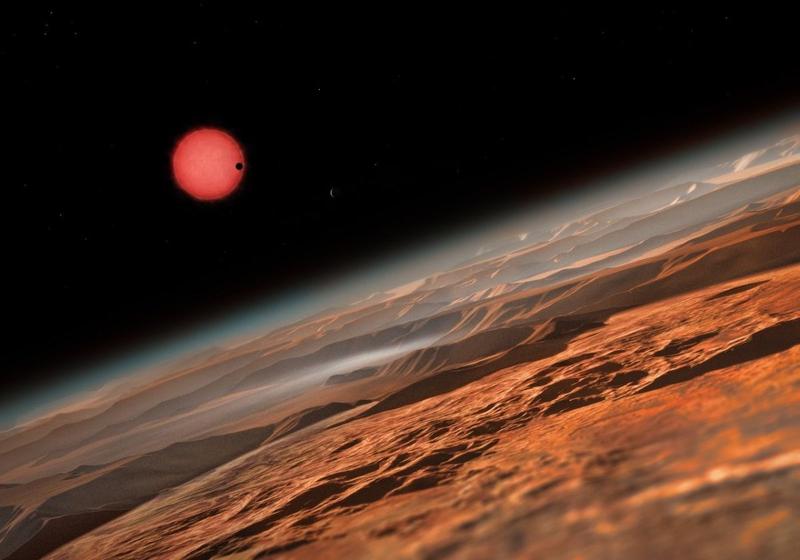 "The transit of Venus", a photo taken by M. Kornmesser used in Extraterrestrial Civilization for Children, a book written by physicist Li Miao. (PHOTO PROVIDED TO CHINA DAILY)
"The transit of Venus", a photo taken by M. Kornmesser used in Extraterrestrial Civilization for Children, a book written by physicist Li Miao. (PHOTO PROVIDED TO CHINA DAILY)
It's a cat but not as we know it. It does not chase mice or purr. Nor does it drink milk. It does, though, pose a problem. Or at least one in particular does. We have Austrian physicist Erwin Schroedinger to thank for this. This is the quandary he posed in 1935.
A cat is put in a box along with a Geiger counter, a vial of poison, a hammer, and a radioactive substance. The radioactive substance decays, the Geiger detects it and triggers the hammer to release the poison. This kills the cat. The radioactive decay is a random process, and there is no way to predict when it will happen. Physicists say this is superposition. We don't know at which point the cat is alive or dead.
There’s real beauty in science, and it should not only be appreciated by those who have the scientific training. What we do is to find a way to convey and spread the beauty to the general public
Li Miao, physicist and author of popular science books
Schroedinger describes this as "living and dead ... in equal parts "until one state or another is confirmed. This, in essence is what quantum mechanics deals with. Classical mechanics deal with everyday size and speed, specific time and space. This certainty is replaced in quantum mechanics by probability. And a new age of understanding this science is about to dawn in China, or to be exact the science says it is probable.
Now switch to the present day. In a street interview in Beijing by the Institute of Physics under the Chinese Academy of Sciences, people were asked about their knowledge of quantum mechanics. Not surprisingly many shook their heads.
The interview was recorded and released as a prelude to a 2020 New Year science speech by Cao Zexian, a professor with the institute. Live online, the speech even challenged the popular New Year variety galas on show at the same time.
Cao said during the speech that, in our time, quantum mechanics should be within the range of knowledge for at least our middle school students.
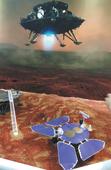 A picture used in Zheng's lecture that depicts the model of a Mars probe. (PHOTO PROVIDED TO CHINA DAILY)
A picture used in Zheng's lecture that depicts the model of a Mars probe. (PHOTO PROVIDED TO CHINA DAILY)
Physicist and best-selling author Li Miao knows how this might be achieved. His books have contributed to making reading about cutting-edge science fashionable, especially among the young.
"The country's golden age of science books for the general public-or science popularization books-is about to come," Li tells China Daily. "Its rising popularity is adding to the momentum."
Li has just released Extraterrestrial Civilization for Children, a newcomer to his For Children series.
Although entitled "for children", many parents on leading review platform Douban say they themselves also enjoy the series, and are sharing it with their children or friends, because it is "easy to follow and fun to read".
The five-volume series covers science, including quantum mechanics, cosmology, the theory of relativity, and the history of time itself.
Dong Hui, editor with CS-Booky who planned the series, says the titles hit almost all best-selling lists online and offline.
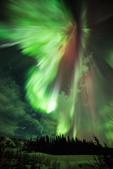 Aurora, a photo taken by Sebastian Saarloos, used in the Extraterrestrial Civilization for Children. (PHOTO PROVIDED TO CHINA DAILY)
Aurora, a photo taken by Sebastian Saarloos, used in the Extraterrestrial Civilization for Children. (PHOTO PROVIDED TO CHINA DAILY)
So far, Li's Quantum Mechanics for Children, first published in 2017(with several reprints), sold more than 200,000 copies. The other titles of his are set to reach 100,000.They won Li numerous awards, including the Wenjin Book Award by the National Library of China.
Li says: "Quantum mechanics is highly relevant to us now, as it is the theory that led to the birth of things like semiconductor chips and the laser. Otherwise, mobile phones would be much larger."
Another of Li's works, Physics in Three-Body, a book that discusses the theoretical roots of the global best-selling science-fiction novel by Liu Cixin, has been received warmly.
"Li Miao has got a spirit seldom seen in Chinese scientists. He is both knowledgeable and equipped with identical vigor for arts and science," Liu writes in the book's preface.
Li says some of his books are sold in South Korea, and may be translated into Spanish in the future.
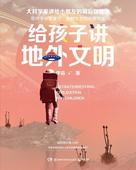 The book cover of Extraterrestrial Civilization for Childrenby physicist Li Miao. (PHOTO PROVIDED TO CHINA DAILY)
The book cover of Extraterrestrial Civilization for Childrenby physicist Li Miao. (PHOTO PROVIDED TO CHINA DAILY)
A physicist's road to stardom
Born in 1962 in Jiangsu province, Li was interested in literature almost as soon as he could read. However, he pursued astrophysics at Peking University and graduated in 1982, believing in the power of science and technology to boost the country's growth.
Li's career as a physicist began to take off while he was working at the prestigious Niels Bohr Institute at the University of Copenhagen in Denmark and later at universities in the United States, including Brown and the University of Chicago.
In 1999, he returned and worked at the Chinese Academy of Sciences.
Li "got his foothold" in his field with a paper published in English in 2004: A Model of Holographic Dark Energy.
In 2013 he moved to Guangzhou to help establish the Institute of Astronomy and Space Science under Sun Yat-sen University, and worked there until last year. He is now based in Shenzhen, as a professor of physics at Southern University of Science and Technology. Quantum gravity, superstring theory and cosmology are some of the weighty topics he follows.
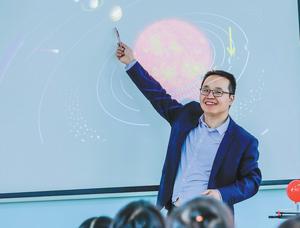 Planetary scientist Zheng Yongchun holds a lecture for primary school students in Guangxi Zhuang autonomous region last year. (PHOTO PROVIDED TO CHINA DAILY)
Planetary scientist Zheng Yongchun holds a lecture for primary school students in Guangxi Zhuang autonomous region last year. (PHOTO PROVIDED TO CHINA DAILY)
He has also written more than 300 poems, 200 short sci-fi stories and numerous columns, some even on men's fashion. This is not a scientist stuck doing boring lab work.
He's keen on popularizing science among youngsters, and he sees writing and introducing what he knows to the younger readers as important as his research. "It's scientists' duty to convey their knowledge and understanding," Li says.
The Walt Whitman and William Butler Yeats fan also spent years mastering "how to" deliver the right words. "I used to try making my words clear to myself as the goal, but years ago, I realized I should make my words understood by others, and skills are needed," he says. He is quick to add that his approach includes telling stories, beginning with scenes familiar to everyone, using images and accessible language to explain hard but core stuff.
Li wrote his book, Quantum Mechanics for Children, based on four mini lectures he delivered online, which met with a warm response from viewers. Meanwhile, his latest book-about extraterrestrial civilization-delves into the realm of biology.
He says he has witnessed the country's great progress in both the economy and science and technology in the past 20 years. Armed with a scientist's knowledge, years of experience as well as a poet's curiosity and imagination, he would like to predict a looming cultural age in the coming decade. "A stable and healthy time for culture is to come. Then, with the rise of creativity, science books and science-fiction writings will embrace their age."
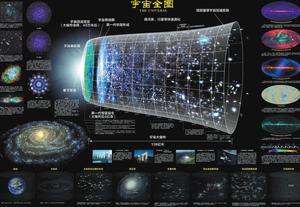 A map of the universe, used as an illustration in Zheng's book. (PHOTO PROVIDED TO CHINA DAILY)
A map of the universe, used as an illustration in Zheng's book. (PHOTO PROVIDED TO CHINA DAILY)
Riding the trend
Science popularization titles have been listed for the State Scientific and Technological Progress Award since 2005 and science books have seen a surge in the children's book market, according to statistics from OpenBook, a leading provider of data and information services for the book industry.
About 20 percent of bookstores' revenue comes from science books sold online, while 15 percent comes from titles sold in regular stores.
In another interview with a popular writer, Zheng Yongchun, planetary scientist and a professor of the National Astronomical Observatories at the Chinese Academy of Sciences, Zheng tells that there remains a consistent demand for science books in China.
"The trend shows that readers are increasingly interested in cutting-edge science and new scientific achievements, compared to the traditional knowledge-sharing books on geography, or flora and fauna," Zheng points out.
He says that back in the 1980s, there was a surge of high quality science works, followed by an overwhelming number of translated works.
"With cutting-edge science like quantum, black hole, gravitational wave, cosmology, lunar and the Mars probe, Chinese scientists and science writers are telling their own story," Zheng says.
And for the books to sell well, CS-Booky's editor Dong claims, they should be beautifully written, easy to follow and with tangible content, be it translated or original. Dong says that Li's work, and Seven Brief Lessons on Physics by Italian Carlo Rovelli, are good examples.
"These books made what was the little known, a mass phenomenon. We need more such authors like Li," she says.
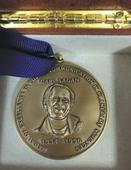 The Carl Sagan Medal for Excellence in Public Communication in Planetary Science Zheng won in 2016. (PHOTO PROVIDED TO CHINA DAILY)
The Carl Sagan Medal for Excellence in Public Communication in Planetary Science Zheng won in 2016. (PHOTO PROVIDED TO CHINA DAILY)
Onward to Mars
Zheng also got the nickname of "Uncle Mars" for his many lectures and books that spread planetary science among the young and the general public.
He was awarded the Carl Sagan Medal for Excellence in Public Communication in Planetary Science in 2016, which honored his "efforts that have significantly contributed to a public understanding of, and enthusiasm for, planetary science".
Actually he is the first Chinese scientist to win that award since it was established in 1998.
"The medal means recognition and more, to me. It signals that China's progress in space probes and research has got world attention," Zheng says.
Zheng was born in a village near Shaoxing, Zhejiang province, in 1977. In the past 15 years, he has been focusing on lunar and planetary geology, and studied lunar soil. He was also heavily involved in the Chang'e-1 and Chang'e-2 missions.
Being part of the research team who constructed the world's first global lunar microwave map, he has been telling incredible stories to science lovers since 2004.
"I write science books and make speeches because I simply feel I need to, for the country's future development, and I'm able to," Zheng says. "I really enjoyed those works, and they were never a burden to me.
"And by sharing what I've learned and been through, I gained new knowledge and experiences, too."
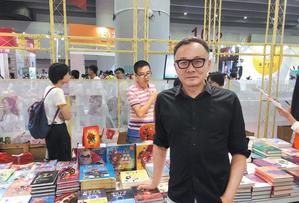 Li poses with a selection of his work at a book festival in Guangdong province in 2018. (PHOTO PROVIDED TO CHINA DAILY)
Li poses with a selection of his work at a book festival in Guangdong province in 2018. (PHOTO PROVIDED TO CHINA DAILY)
Like Li, Zheng writes with the readers' demands in mind, and he reads avidly too.
He even translated books like The Pluto Files, Endurance: A Year in Space, a Lifetime of Discovery and How to Find a Habitable Planet to observe and help improve his own writing.
Zheng is a member of the China Science Writers Association, and has published Maps of the Universe, of Moon, of Mars and of Solar System, and Pluto Flyby: Shedding Light on Origin of the Solar System.
"Better science books are not only about knowledge and theories, they cover a systematic overview of topics in various aspects, such as culture, society, history and other humanistic perspectives," he says.
Zheng also hopes that more Chinese titles, which explain the country's achievements in space probes and their findings, can access international readers.
Zheng agrees with Li's idea on popularizing science to all.
Li says: "There's real beauty in science, and it should not only be appreciated by those who have the scientific training. What we do is to find a way to convey and spread the beauty to the general public."
Contact the writer at meijia@chinadaily.com.cn


